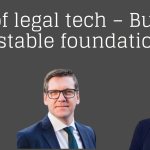In this personal goodbye to the industry, Vince Neicho shares some of the highlights and milestones of his distinguished, half-century career, as well as the things he has learned along the way. Vince contributed to the initial development and subsequent evolution of e-disclosure practices in the UK. Our thanks to Vince for asking Legal IT Insider to publish his ‘signing off’ – it’s a privilege.
Well, the time has come for me to finally retire. I have been extremely fortunate to have spent my entire career surrounded by truly brilliant and inspirational people at the top of their game. I am privileged to call many of them good friends.
As I summarise the best part of half a century, there are so many names I could mention, but in the interest of keeping the post a little shorter, I will mention only a few. I ask those whose name I do not mention not to be offended – the part you have played in my journey is immense nonetheless.
My 42 wonderful years at Allen & Overy were complemented by over 4 fantastic years at Integreon.
Qualifications? What qualifications?
When I look back at some of the milestones, they are really quite remarkable and I dearly hope they will serve to demonstrate to others that there is such a concept as Social Mobility. It has been enormously rewarding to have been part of the transformation of legal services, without having had the benefits and privileges of a University background. I didn’t even go to college!
Back in 1975, I left school at 16 and two weeks later joined the post-room team at A&O with the hope that I would progress into one of the legal departments. When my turn came, I let others overtake me as vacancies in a number of departments arose – I could not see myself working anywhere other than litigation!
I quickly developed an interest in the defamation work the firm undertook for News International (News of the World and The Sun). As my colleagues and mentors retired, I was – and will ever be – so grateful to the confidence shown in me and support offered by partner (and later Judge) David Mackie. David trusted me with a key role in managing the extensive portfolio of cases involving News. In that role, I had great fun meeting several celebrities and working closely on high profile cases from start to finish.
Discovery and Disclosure
It was in those libel cases that I realised the importance of the discovery (or “disclosure”, as we now call it) process. Despite my lack of legal qualification, but subject to the supervision of David and other senior lawyers, I ran the discovery processes, often single-handedly.
As I became more experienced, I was given the responsibility to train up-and-coming lawyers on the importance, pitfalls and rewards of carefully thought-out discovery strategies. I performed this role right up until I left the firm, notably having designed and presented training courses for the highly impressive University of Litigation, which runs twice a year for newly qualified solicitors (and latterly key clients).
A change in focus later resulted in the libel workload falling away. Although I didn’t realise it at the time, this introduced me to a very important life skill – the ability to convert a potential threat into an opportunity. What did I do now? Leave the firm and seek employment in the libel field elsewhere? Was that even possible with my lack of qualification? No, I decided to look for other areas within A&O where I could apply my skills and experience.
Paralegal management and future super-stars
I turned my attentions to setting up and managing a team of litigation paralegals. I retained my responsibility of being involved in most of the firm’s disclosure exercises and now had the ability to train and make available dedicated teams to assist in the process. The model was completely different to previous arrangements. Whereas paralegals were previously hired as and when needed on particular cases by particular associates, what I set up was, in effect, a managed service paralegal resource within the department. The strengths of the resource were that the specially recruited paralegals sat together and worked as a team, yet dedicated themselves to their own cases. Soon after, other A&O departments and many other leading firms adopted similar set-ups. Indeed, many years later, it was also the basis on which A&O modelled their very successful Legal Services Centre in Belfast.
A major reward for me in my role as Paralegal Manager, was that I was responsible for the hiring of hundreds of paralegals over my tenure. Thus, I was able to give the opportunity to hundreds of people to gain a foothold on their legal career ladders. I take enormous pleasure from seeing how those individuals have since progressed their careers. Many are now in key positions at major law firms or corporate/financial entities. It is amazing to think that I have played a small part in their incredible journeys.
Litigation support and LiST
As the paralegal department matured and expanded, the reliance on technology increased and we saw the birth of “Litigation Support”. This was another milestone and, once again, invoked a necessity to exercise my threat v. opportunity philosophy. Would the technology obviate the need for paralegal support? The answer was to ensure that the two worked hand-in-hand and, more than that, the paralegals could become the experts in using the technology to further assist the lawyers. I now had the dual role of Paralegal Manager and Litigation Support Manager, which was unusual and demanding, but also gave me the opportunity to ensure that the two teams always worked in harmony.
Early on in my Litigation Support role I first met long-time good friend, Greg Wildisen. Following a due diligence process, I had just recommended and installed the Ringtail eDisclosure platform and it was Greg that educated me on how to get the best out of the technology and to shape the important interaction between technology and legal process. In the years that followed, Greg and I went on to jointly publish key articles and speak together on platforms around the world.
Back to the beginnings of Litigation Support … After a while, it became frustrating that the technology appeared to be designed such that the various platforms of choice of the major law firms were designed not to speak to each other – meaning that sharing of data and documents was tiresome, expensive and almost impossible. That got me thinking – although we work in an extremely adversarial environment, there must be a level at which law firms could work together for the common good of their clients. I thought the ideal level might be “litigation support”. I used to attend the excellent informal annual get-togethers for the ever-evolving litigation support community – the brainchild of key members of that particular fraternity, Jack Bond and Bill Onwusah. I mentioned my “collaboration” thoughts at one of the events and was encouraged by the positive response. To cut a long story short, things progressed and I became a founding member of LiST (Litigation Support Technology) Group. Boasting key individuals from each of the leading law firms, LiST quickly became a very powerful player and think-tank in the litigation support arena.
LiST achieved some amazing things – all the more incredible when considering that the key contributors and members performed LiST initiatives in addition to their day jobs. One of the highlights was when we took Adobe to task after they queried one of our suggestions as to the standard document format for exchange of data. They flew senior executives over to meet us and wound up fully accepting that we could only recommend their flagship format – pdf – if they were prepared to open up the code to enable the key litigation support platforms to incorporate it into their products. Lo and behold, that is exactly what transpired and is one of the main reasons that today’s market-leading products incorporate pdfs within their repertoire.
In many ways, LiST was ahead of its time in promoting cooperation between competing parties. Now we see that such cooperation is mandatory according to the rules of England and Wales and, indeed, many other leading jurisdictions around the world.
LiST’s modus operandi was to form dedicated Working Groups, each to look at a specific topic, brainstorm and come up with recommendations for discussion at the wider group and ultimately the wider profession. There were many key individuals who dedicated enormous amounts of time and effort and played their part in changing the legal profession for the better. When it came to drafting and analysing Civil Procedure Rules and suggesting changes thereto, my interest was shared by two people in particular – Jonathan Maas and Chis Dale. Under the strict membership rules, Chris Dale was in fact an informal co-opted member of LiST and we always appreciated his strong support of our work. As with Greg, over the years, I also enjoyed co-writing articles and sharing numerous speaking platforms around the world with Chris and Jonathan.
Practice Direction, judges and predictive coding
LiST had a bearing on another important milestone for me. Senior Master Steven Whitaker had been asked by Lord Justice Moore Bick to draft a Practice Direction dealing with use of technology in the disclosure process. Chris and I were honoured to be part of the elite Working Group Steven pulled together to perform the task. After a prolonged period of discussion, numerous meetings and many drafts, I recall that Steven and I added the final touches to the draft at A&O’s New York office on a Sunday morning break whilst we were attending the LegalTech conference in the city! The group’s work passed muster and for many years became part of the English and Welsh Civil Procedure Rules on how to utilise technology in the disclosure process of legal proceedings. More than that, I know from my discussions with Judges from the US, Singapore and Hong Kong, it served to influence the rules and protocols in other parts of the world. Not bad for the boy with no legal qualification and no university background!
Linked to the success of the Practice Direction, I got to work closely with Lord Justice Jackson on his game-changing Litigation Costs Review and later assisted him with disclosure chapters in subsequent books he had published. I also got to renew my acquaintance with Lady Gloster, when responding to her consultation request for the pilot she headed up to build on the disclosure rules we had put in place. On the judicial theme, I am also privileged to have worked with a number of judges, including addressing meetings of Mercantile judges and devising and running a session at the Judicial College. I also got to meet and befriend (now retired) US Judge, Andrew Peck. I recall our first meeting was in Hong Kong (around 2009?), where Andrew expressed interest in a talk I was giving on use of what later became known as Predictive Coding. The Commercial Court had sanctioned use of the pioneering technology in one of A&O’s cases, where forward-thinking partner and friend Frances Van Eupen had supported its use. Frankie was later tragically taken from us long before her time, but I shall always remember how supportive she was of what we were endeavouring to achieve. Andrew went on to become the first judge to sanction use of Predictive Coding in a landmark US case.
Outsourcing and insourcing
My conversion of threat to opportunity concept was deployed again back in 2009, when Head of Litigation at A&O, Tim House, asked me to look into the possibilities of outsourcing areas of legal work. Again, I side-lined thoughts that the very existence of the A&O paralegal was under threat and concentrated my efforts on coming up with (what was at the time) innovative ways of working with outside providers to afford significant costs savings to clients, without any detrimental effect on quality. I carried out extensive due diligence on potential outsourcing partners, including site visits in India and the Philippines. Integreon were the standout candidate and I happily led A&O to be among the first of the major firms to proactively outsource legal document review, not only to an outside provider, but also offshore. Thus A&O’s (and my own) fruitful relationship with Integreon began. I put together a Suite of Options, which won an award at the FT Legal Innovation Awards and featured the Integreon option. Lawyers were urged to actively promote outsourced offshore review to clients. Also within the suite, was the suggestion that I met with clients early in the process to assist them in the planning of the disclosure practice internally and to ensure that they involved the relevant technical expertise from within their own organisation. Although that might be standard process for some nowadays, back then it was unlikely that anyone other than the case lawyers would have interacted with the client.
A further threat to opportunity experience was in 2011, when A&O opened its Legal Services Centre (LSC) in Belfast. As mentioned earlier, some aspects of the service were modelled on my paralegal set-up in London. Nevertheless, it was potentially the latest threat to the need to employ paralegals in London – not a happy situation for the Paralegal Manager! Instead of succumbing to the potential threat, I championed the services of the LSC and eventually became responsible for their integration into the London Litigation Department, thus, as was the case with paralegals and technology many years earlier, the opportunity arose to ensure that each sector was able to work together harmoniously. I helped set up the legal training programme for Belfast Legal Professionals and ran the “paralegal”, document review and disclosure aspects of the programme. As part of this, I included sessions where the Legal Professionals actually met with the paralegals to foster future good working relationships between the two groups. The introduction of the LSC also raised the question “do we still need to outsource document review?” The answer was (and is) “YES!” Most reputable Alternative Legal Service Providers will be quick to state that they do not dispense legal services. They therefore require supervision. The LSC team were (and are) superbly placed to undertake this at a favourable cost point to the end client. Everyone’s a winner!
eDisclosure
As my name became synonymous with developments in eDisclosure, as referenced earlier I regularly spoke at and attended conferences around the world. I shared panels and speaking slots with, and learnt from, so many brilliant people over many years. It was at my first speaking gig that I met the person who quickly became a friend and mentor, the late great Browning Marean. Apart from being the nicest man you could wish to meet, Browning was very funny, mischievous, supportive and incredibly influential. When we sadly lost Browning in 2014, the legal industry as a whole was a poorer place.
Nearly there!
Throughout my 42 years at A&O, I was inspired and supported by many key partners. In particular, I would like to thank Peter Watson, Andrew Clark and Calum Burnett, whose support and encouragement were phenomenal. I will be forever grateful to each of them.
The final chapter in my incredible journey came about thanks to long-time friend Jeff Davis. Jeff had always said that I should call him if ever I should bring the curtain down on my A&O career. No-one, least of all me, ever thought that would happen, but there came a point at which I did explore whether I might benefit from a step outside of my comfort zone. Long story short, I took up Jeff on his offer and I have very much enjoyed the last 4 years or so working with him at Integreon, building on the experiences I gained at A&O, meeting new friends and re-connecting with so many people from my A&O past. Latterly, it also gave me the opportunity to work closely with someone I have always admired, Clare Chalkley. Clare has already proven to be considerably more than my successor and she has much to offer the worlds of e-Disclosure, cyber, ALSP functions and the legal profession at large. I look forward to following the next chapter of Clare’s role in the continued transformation of legal services.
Final thoughts
It is now time for me to retire and I would like to thank all of those I have worked with across the profession over the years and to wish each of you continued success in your careers.
As mentioned earlier, I am very fortunate to have played my part in what has perhaps been the biggest period of change the legal profession has experienced for decades. The technology we rely on today and will welcome tomorrow is responsible for what has been a full-on technology revolution – and that in a profession not known for its propensity to embrace change. I am excited that a number of key personnel have demonstrated that they are ready to take the use of technology in legal proceedings to the next stage and I send them my very best wishes.
Tips and advice
Should anyone still be reading at this point, I offer the following tips and advice:-
To those at the beginning of their career:
- Get yourself the best education you can. But if you do struggle, don’t give up. Get yourself a “can-do” attitude, be determined, have confidence in yourself and your capabilities – and be a nice person! When employing others, my mantra was always that I could teach a nice person to undertake the role, but I could not teach someone able to do the role to be a nice person.
And to everyone, no matter what stage of their career:
- When you are faced with a threat, or adversity, don’t give up and pull the shutters down. Instead, look at all the angles, find an opportunity and work on a strategy to make it work for you and your employer/clients.
- Look for opportunities and be ready to “reinvent” yourself at appropriate times.
- Always keep an open mind on new technologies and processes and do what you can to advance and enhance them.
- Always look for better ways of doing things. Be ready to challenge so-called tried and trusted processes or procedures.
- When facing criticism, try not to take it personally. I think this can be very difficult and, to be honest, was perhaps my greatest weakness.
- Listen to all stakeholders, but be ready to fight your corner once you have fully evaluated everyone’s view and opinion.
- Be happy in what you do and the part you play.
Thank you and goodbye.
Vince









